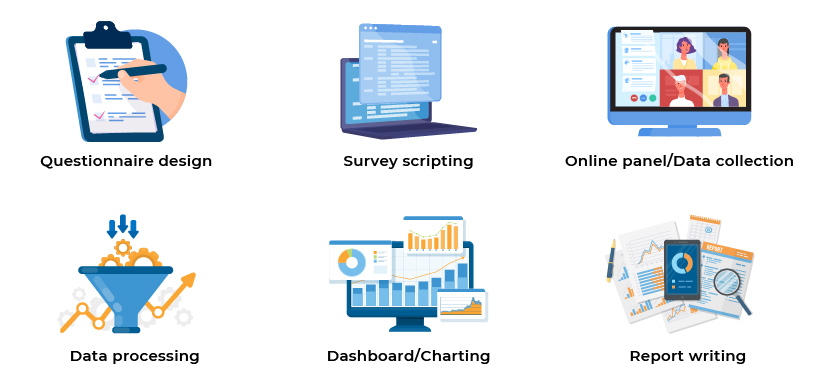Published on July 30, 2021 by Raman Kumar
A key function of the market research industry is to help organisations draft dynamic product or service profiles that match the expectations of consumers. As reported by The Business Research Company, the global market research industry grew at a CAGR of 2.6% from 2015, reaching a value of USD75.76bn in 2019. However, it declined to USD73.94bn in 2020 amid the lockdowns and social distancing norms implemented due to the COVID-19 pandemic. The market research space managed to do fairly well despite the pandemic because of its capability to operate completely online and its relevance across sectors. Likewise, other industries that can operate completely online have seen steady growth (some of them seeing significant uptrends) and have increased their research budgets, as business and research go hand in hand. As global business activity returns to normal, the market research industry is anticipated to recover at a CAGR of 4.1% from 2021, reaching USD82.87bn in 2023. New technologies such as artificial intelligence and machine learning are expected to provide it substantial opportunities, as they will enable faster analytics and report creation. This is particularly relevant considering quality, speed and cost effectiveness will drive market research in the coming years. Let us look at some of the trends in the industry.
Quick surveys – Length of interview (LOI), which refers to the average time required to complete a survey, plays a vital role in the successful completion of surveys and is a critical parameter for all stakeholders involved in research. Shorter length surveys, such as polls, that are setup and deployed within minutes and for which answers are available by day end are expected to gain wider use in market research. The large presence of mobile-ready and pre-targeted audiences will ensure quick turnaround and faster results. Factors such as decreasing attention span in humans (as per a study conducted by the Technical University of Denmark) also factor in LOI, given that data quality has been known to deteriorate once survey lengths cross 15-20 minutes; quick surveys, therefore, will not only provide faster results but also help curb data quality issues. With a major part of data collection being done through mobile devices, it has become even more important to get all required answers using as few questions as possible. A case in point is when, during 4Q 2020, long surveys were struggling to get attention because the US presidential elections had flooded panels with quick poll surveys that were faster to fill in and as a result getting much better response. Quick polls have already gained in popularity across social media platforms; for example, “influencers” now frequently pose one or two questions at a time and get quick responses from followers.
Do it yourself (DIY) – As the name suggests own, this approach allows users to gain insights, develop new skills and save on costs. The DIY approach is already prevalent in the market research arena, mainly for sampling and over the full cycle of projects to some extent. Many tools are available today that allow users to create surveys, field them and help generate reports/charts/dashboards based on the data collected. While it is important that people who opt for this research approach must have expertise in multiple functions to perform the requisite tasks, they will have advantages such as total control on the project cycle, flexibility with execution and no timeline dependency on other teams. With technological advancement, we will have access to sophisticated integrated tools that perform complex surveys with ease in future. As a result, it would be natural that more researchers adopt this approach, especially when organisations with access to targeted audiences prefer to do in-house research.
Artificial intelligence (AI) and machine learning (ML) – AI focuses on three cognitive skills – learning, reasoning and self-correction; this enables a machine to simulate human behaviour. ML is a subset of AI, through which machines automatically learn from past data; it is mainly concerned with accuracy and patterns. These attributes are a perfect fit for the analysis of open-ended text data in real time and can help the market research community save time, effort and cost. These will help not just researchers to get quality data but also panel companies to incentivise only those respondents who are qualified as useful completes and to identify records that are to be discarded at an early stage. Another huge benefit could be the implementation of relevant follow-up questions in online surveys based on previous responses from a respondent; this will help bring a qualitative aspect to quantitative research. The application of such technologies will thus allow researchers to explore new horizons in the online research space, resulting in deeper and more meaningful insights.
Social listening – Social listening is the process of identifying useful trends and insights about brands, competition and industry trends from conversations happening on social media. It has become next to impossible for brands to avoid a social media presence, and, from a research point of view, this is a new and evolving area where AI and ML can play a significant role. Researchers can use this as part of secondary research as well. Given the fast pace of the digital world, trends change frequently, and brands need to be adaptive to stay on top of consumer preferences. While traditional market research was a time consuming process, particularly given that the interpretation of results could take weeks or even months, social media has allowed easy access to actionable insights on consumer impressions through people’s discussions about brands and trends. As of June 2021, the global population was at 7.9bn, of which c.4bn people used social media; while this latter number may not represent the number of unique individuals using these platforms, even half of this number would make up one-fourth of the world population. Due to this ever-growing footprint of social media, it is becoming increasingly important to monitor it and use social listening to understand consumer behaviour and macro and micro trends. Researchers can isolate data that matters most while keeping a pulse on other peripheral patterns that emerge over time. Another aspect of social media listening is that it provides unbiased feedback and allows companies to gain insight into opportunities for improvement and innovation so that they can engage with their target audience effectively and nurture their association for longer terms. Because of these factors, social listening is expected to become one of the biggest socio-cultural trends in marketing research.
Online qualitative research – Without the ability to run in-person focus groups, interviews, observations and other qualitative research methods amid the COVID-19 pandemic, researchers were forced to take these activities online; that said, the results have been so amazing that it is definitely going to be one of the most beneficial market research trends to come out of the crisis. Now that researchers have experienced the benefits and ease of virtual focus groups, such methods have become essential in every market research toolkit. The technology available and the ability to be able to reach audiences anywhere, at their convenient times, enable organisations to get access to more people, thus gaining more authentic and diverse opinions and increased engagement. We cannot close this topic without mentioning AI-integrated video support, which has facilitated research through functions such as object and facial recognition including tone, sentiment, emotion, speech, themes and activities. Although the human mind’s complexities, such as intuition, sentiment, subconscious decision-making and synthetic and integrative thinking, could cause minor bumps in complete dependency on machines, breakthrough technologies such as emotion AI (which uses multiple aspects including facial coding, eye tracking, voice AI and brainwave mapping) can provide greater insight and hold considerable potential for the industry.
How Acuity Knowledge Partners can help
Acuity Knowledge Partners (Acuity) has two decades of experience and a well-established reputation in the market research industry. It offers a full range of services in end-to-end research and standalone services. Our team of experts is committed to providing the highest quality work while ensuring adherence to industry compliance guidelines. Benefitting from its strong foundation, Acuity holds dynamic capability to keep pace with market trends and fulfil industry requirements.
Sources
www.thebusinessresearchcompany.com
Tags:
What's your view?
About the Author
Raman Kumar working as Delivery Manager with Acuity knowledge Partners has 14 years of total work experience in Market research domain with an expertise in Application support, Field/Sample management, and Full Service Project Management. He has successfully worked in different roles with multiple market research agencies to accomplish a diversified profile.
Like the way we think?
Next time we post something new, we'll send it to your inbox








